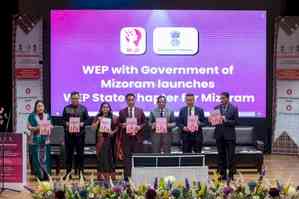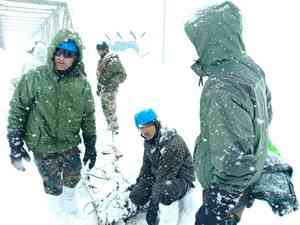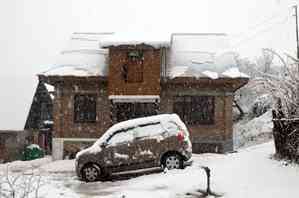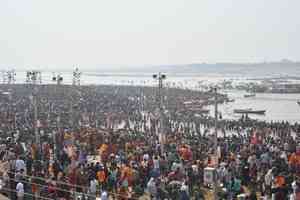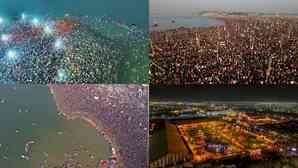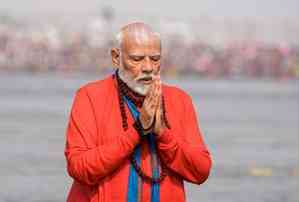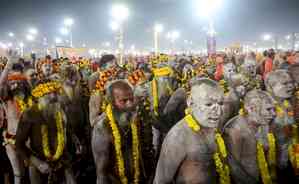After ending terror, we will reclaim what has been lost: HM Amit Shah
Calling Kashmir an inseparable part of India and its soul, Union Home Minister Amit Shah on Thursday said Prime Minister Narendra Modi-led government has not only eliminated the ecosystem of terrorism from the Kashmir Valley but is determined to reclaim what has been lost, a veiled reference to the territory occupied by Pakistan and the cultural glory of the region.
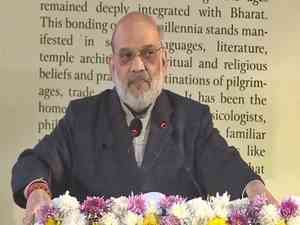
New Delhi, Jan 2 (IANS) Calling Kashmir an inseparable part of India and its soul, Union Home Minister Amit Shah on Thursday said Prime Minister Narendra Modi-led government has not only eliminated the ecosystem of terrorism from the Kashmir Valley but is determined to reclaim what has been lost, a veiled reference to the territory occupied by Pakistan and the cultural glory of the region.
He was speaking after releasing the book, 'Jammu Kashmir and Ladakh: Through the Ages - A Visual Narrative of Continuities & Linkages' that seeks to present the story of Jammu and Kashmir and Ladakh. The book by Indian Council of Historical Research has been edited by Raghuvendra Tanwar.
“Kashmir has always been an inseparable part of India, is so today and will remain in future also and we shall soon see Kashmir regain its cultural glory,” said HM Shah.
He recalled a statement of Syama Prasad Mookerjee, “Jammu and Kashmir is not only a part of India but an inseparable part of the country’s soul.”
This book has proven that Kashmir and Ladakh are also an inseparable part of our culture and heritage, he said.
“Article 370, which was an attempt to separate Kashmir from the nation, was also pulled down,” he said.
"In the Constituent Assembly, the majority did not want Article 370 to be a part of the Constitution.
However, it became a part. But there were some people who, when it became a part, felt that it was necessary to write it as a temporary provision,” he said.
“What is artificial, what is not natural or organic, does not have a long-lasting existence. And it was with the strong determination of PM Modi that on August 5, 2019, Article 370 was abrogated. It ended a tainted chapter of our post-Independence history. And from there, a new chapter of Kashmir’s development alongside the rest of India began," he said.
Highlighting the government’s focus on Kashmir, HM Shah said: "We have not only gained control over terrorism, but we have also succeeded in stopping it. Narendra Modi government has also worked to eliminate the ecosystem of terrorism from the Valley.
"And all of this has happened for this land, which has made a significant contribution to the civilisations of the country and the world. The scholars of Kashmir have enriched our country’s languages, grammar, and various forms of knowledge."
"In 2024, there have been no incidents of stone-pelting in Jammu and Kashmir. Over 25,000 Panchayat members, Sarpanch, Tehsil Panchayat members, and District Panchayat members won elections and are now running their villages, Tehsils, and districts. Panchayati Raj and democracy have deepened at the grassroots level. The highest voter turnout in the past 33 years was recorded recently," he said.
Talking about the book, the Home Minister said about 3,000-year-old scriptures were scanned and the editor highlighted the historic reference of Kashmir in the book.
The ruins of temple and the culture reflected in the pictures and the journey of Buddhism from India towards Afghanistan and Western Asia recorded in the book also reconfirm that Kashmir has always been a part of India, he said.
The use of photos of temples damaged by raiders, use of Sanskrit in Kashmir, Dogra dynasty’s progressive rule, Maharaja Ranjit Singh valor, and the mistakes committed after 1947 and their rectification have presented 3,000 years of history of Kashmir in the book, said HM Shah.
"History cannot be limited or recorded by remaining confined between Lutyens’ Delhi to Gymkhana Club or Dariba Kalan to Ballimaran. History must be understood by mixing with people, understanding the culture and language of people,” he said, slamming a phase of 150 years during with historians adopted a very narrow view.
The book attempts to document the story of Jammu and Kashmir and Ladakh from a perspective and format that enables an overview for both the subject specialist and those less conversant.
It is presented in seven sections that cover over three thousand years of the region's history.
Each illustration selected for inclusion has been done with care, being representative of an age, its importance and contribution to the larger historical canvas of Indian history.
Published in Hindi and English, this book is the result of collaborative efforts of the National Book Trust, India, and the Indian Council of Historical Research.
--IANS
rch/pgh



 IANS
IANS 
